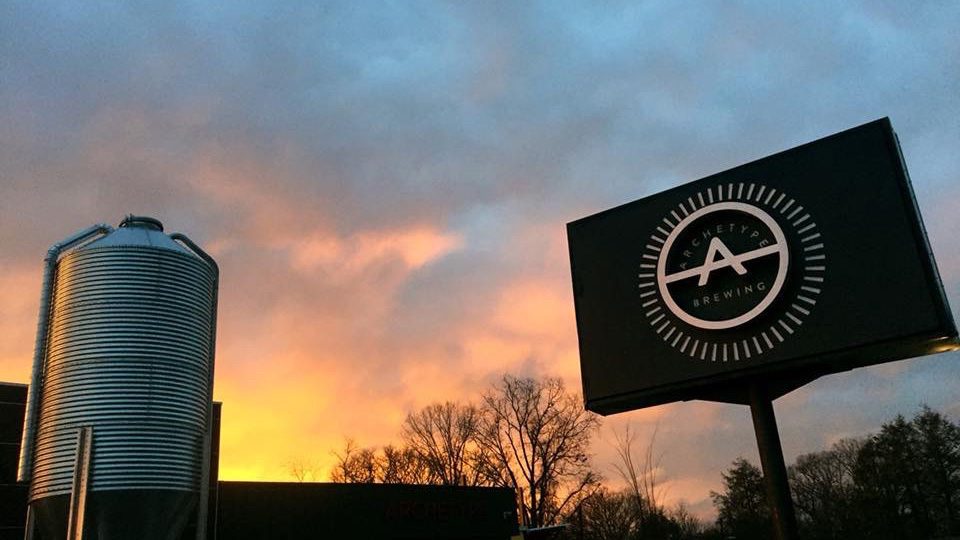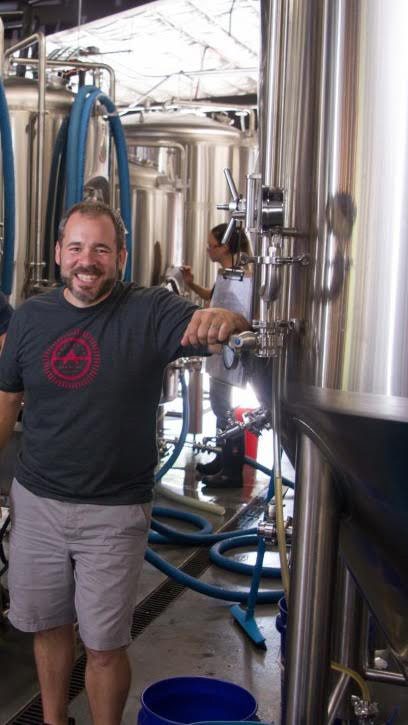Alumnus fights to keep his company alive amid unprecedented pandemic

In 2019, Archetype Brewing opened a second location in Asheville, North Carolina. That’s no small feat in a place known as “Beer City USA,” and the expansion represented the boldest step yet taken as a small business owner by Brad Casanova ’03, M’05 since he founded the company in 2017.
“We were finally past that growth phase where we could sit back and start really earning some income,” Casanova said. “And that’s when this hit.”
“This” would be the novel COVID-19 virus that stopped most of the country in its tracks earlier this year. Archetype lost more than 90% of its income instantly when stay-at-home orders by Buncombe County and North Carolina Governor Roy Cooper forced all “non-essential” businesses to close, and Casanova and co-owner and head brewer Steve Anan have spent the weeks since in a desperate fight to stay afloat.
One thing that became apparent quickly was that an every-man-for-himself approach wasn’t going to work – for anyone. And while Archetype still faces an uncertain future, unprecedented levels of customer support and business collaborations have kept hope alive.

Brad Casanova ’03, M’05 stands next to some brewing equipment at Archetype Brewing in Asheville, North Carolina.
“We’re a pretty community-minded brewery, and it’s really come back to help us in this time,” Casanova said. “(Customers) are coming in for our sake just as much as their sake and leaving $20, $40 tips for a six pack., which is really cool to see.”
He recalled how a customer told him, “You guys better not close. This is my spot … Anything I can do, you let me know. But I want you guys open when things get going again.”
Like most small breweries, packaged beer – cans, bottles and growlers – represented a tiny fraction of Archetype’s sales before the shutdown, and it was only available on site. But Casanova immediately shifted focus to promoting pick up or delivery, combining with a bakery and Asian fusion restaurant on the same block to increase offerings and customer base.
“It’s small businesses joining together,” Casanova said. “It’s a really great design, and I hope it continues, actually, after things recover.”
Cooperation hasn’t been limited to helping only business owners, either. The shutdown resulted in mass layoffs across the service industry, and Archetype was no exception. But throwing their employees a lifeline as well was the reason Archetype joined DSSOLVR, Twin Leaf Brewing and Bhramari Brewing Company on a project called “Stay Home/Stay Asheville.”
The four Asheville breweries worked together to brew a one-off beer, with all proceeds from sales of the $15 four-packs going to New Belgium Brewing Company’s Bar and Restaurant Relief Fund. They sold out in a couple of hours.
“The beer was brewed at Bhramari, and River Bend, the local malt company, donated all the malt, and White Labs, the local yeast company, donated all the yeast. The breweries supplied hops,” Casanova said. “We love knowing the people that we’re helping, and that’s one of the things that’s kind of taken our mind off the financial and social challenges right now. Doing things like that keeps things light and has helped the morale, especially for our staff while they’re at home.”
One thing that initially wasn’t much help to Archetype Brewing was the government’s Paycheck Protection Program. But recent tweaks expanded the period to invest money from the special loans from eight weeks to 24 and lowered the thresholds for forgiveness.
“It appears the business owners spoke and the legislators listened,” Casanova said. “Under the new terms, our loan balance will likely be forgiven in full, buying us time without taking on additional debt.”
A new version of the stimulus checks the U.S. government mailed in April would have helped even more. As it is, restricting cash payments to individuals most likely means little of that money will find its way to businesses dependent on a consumer economy.
“The U.S. government could give me $100,000, and if I’m not leaving my house to spend it or if I have nowhere to spend it, it’s not going to help,” Furman Assistant Professor of Business and Accounting Jon Handy said. “One thing you could do that may be helpful is, instead of loaning (businesses) cash for payroll, create a pool of funds that allows them to create a method of delivery or some way to reopen their business while maintaining proper social distancing.”
North Carolina’s governor allowed breweries to open their doors on May 22 as part of Phase 2 of the state’s easing of COVID-19 restrictions, though they cannot operate at full capacity. Casanova hopes the worst is behind him, though North Carolina has experienced a surge of coronavirus cases since the beginning of June.
“We’re still functioning as if we have an outlet for our product and that things will start to recover. Luckily, we’ve had the support of our landlords as well as banks and vendors. They’ve all been pretty understanding. They get it,” he said. “Personally, it’s been challenging, but owning a small business has never been easy. So I kind of feel like the rest of the world is just joining me.”
Casanova earned both undergraduate and master’s degrees in chemistry from Furman and had never set foot in Asheville until he took a position as a special agent and forensic chemist with the North Carolina Department of Justice, where he provided analysis on the detection of controlled substances and responded to clandestine methamphetamine labs. But he wanted a job that allowed him to be around people, and skills as a chemist allowed for a relatively easy transition to the world of beer brewing.
“What’s required to make good beer is you’ve got to document everything. Our brew logs are essentially lab notebooks, because we have to be able to go back and say, ‘Why did this turn out this way? What was different between this batch and the other batch?’” he said. “If you don’t document, you’ll never be able to learn from it. And that’s straight from the chemistry lab.”
Casanova is candid about the tremendous pressure he’s felt since the pandemic struck. But he also takes some solace in the fact that if Archetype Brewing doesn’t survive it won’t be because of his mistakes.
“I think the challenges of being a business owner are usually understated – the mental health issues, just the pure stress, the toll it takes on your life, your family,” he said. “I don’t know if it makes me feel better when I hear that people are few weeks away from closing, but it does put things in perspective. If we’re going to go down, it’s going to be because of coronavirus. Not because I couldn’t figure things out.”